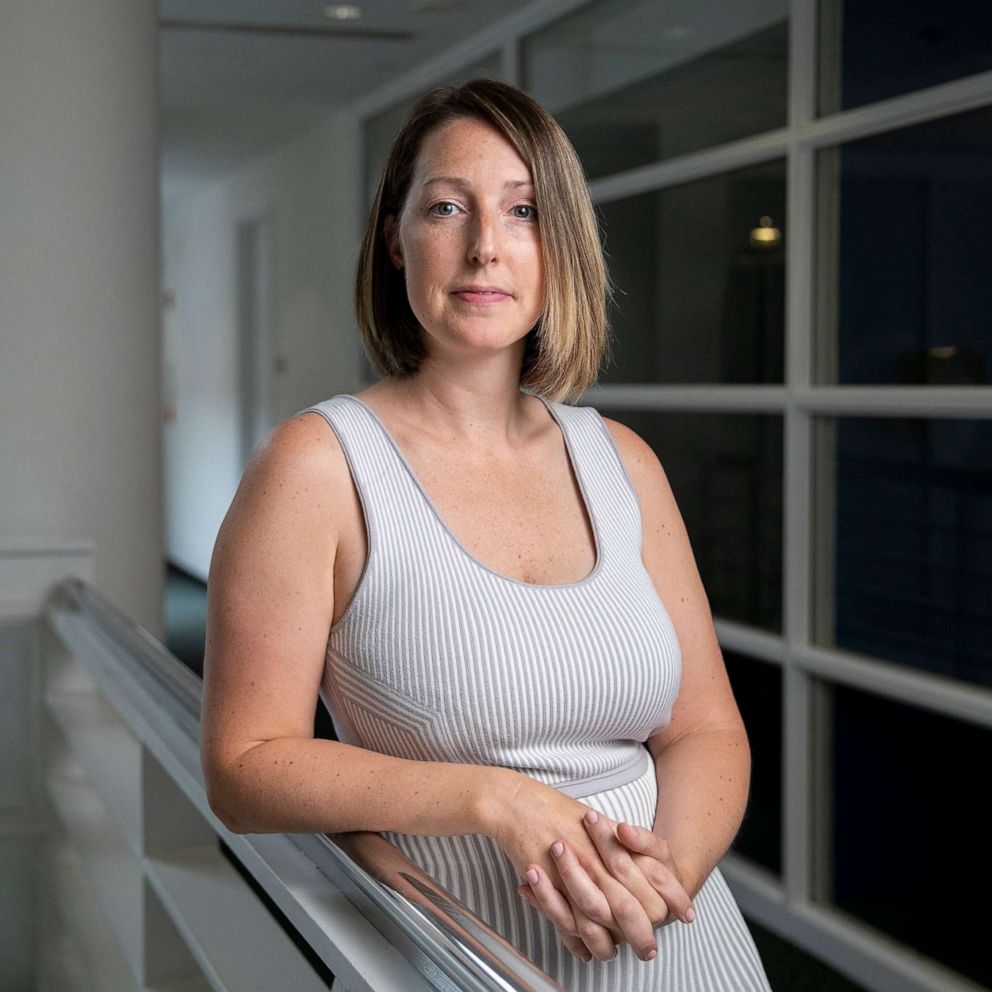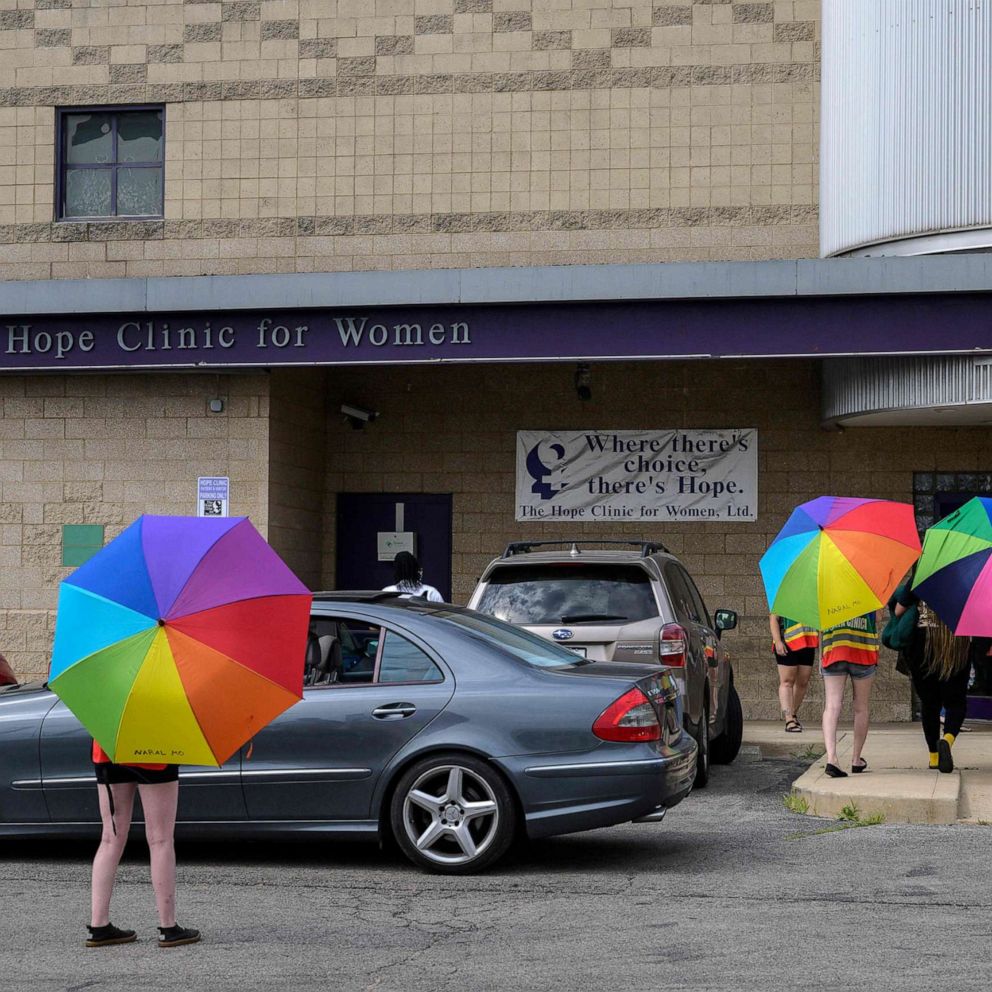Woman says she battles trauma, depression 1 year after not receiving abortion care under Florida law
Deborah Dorbert's son Milo died shortly after his birth in a Florida hospital.
Deborah Dorbert knew it would be excruciating, both emotionally and physically, to carry to term and deliver a baby doctors told her would only live a few minutes, at most.
And it was, she said.
"It was the most excruciating pain to go through," Dorbert, 35, told "Good Morning America" of giving birth to her son Milo Evan Dorbert on March 3, 2023, after not being able to access abortion care in her home state of Florida. "Delivering him just to watch him die was just all extra added trauma."
What Dorbert said she never could have imagined was the mental health crisis that would unfold for her over the next year, including, she said, depression and post-traumatic stress disorder.
"[It was] almost as if you were thrown out in the middle of the desert and now you had to learn to survive," Dorbert said of leaving the hospital without a newborn. "They didn't give any kind of support, no, 'Here are papers,' or, 'Here are therapists.'"
For the first nine months after giving birth, Dorbert said she went "numb" as she grieved the loss of her newborn son, while also trying to parent her older son, now 5, and coping with the normal postpartum physical struggles that moms face, like her milk coming in and her body recovering from giving birth.
In December of last year, Dorbert said she was so deep in her struggle, it became a life-threatening danger not to address it.
"It wasn't until I ... was starting to have suicidal thoughts and just having breakdowns at home, that I finally turned to my husband and I said, 'I need help,'" Dorbert recalled, referencing her husband Lee, with whom she shares her older son Kaiden.
The forward motion of everyday life -- parenting a 5-year-old and explaining his brother's death to him, helping her husband navigate his grief, paying bills, finding part-time work -- all while dealing with her own trauma from carrying and delivering a pregnancy she and her doctors knew would end in death, had become too much for her to handle.
Too much silence at any point during the day would take her back to those awful moments and sounds in the hospital, Dorbert said. Running into people who knew she had been pregnant and now asked her how her newborn was kept her wanting to hide in her home.

In November 2022, around 24 weeks into her pregnancy, a routine ultrasound led the Dorberts to learn their second child, whom they were thrilled to be expecting, had Potter syndrome, a rare and fatal disorder caused by decreased amniotic fluid surrounding the baby in the uterus, according to the National Institutes of Health.
The decreased amniotic fluid caused by the disorder prevents the baby's lungs from developing properly, according to the NIH.
Dorbert said she and her husband were told their baby would be born either stillborn or only live for a few minutes. Knowing that the baby would not survive and that the pregnancy would be high-risk for Dorbert, the couple agreed with their doctor's decision to induce the pregnancy early versus carrying it to term.
In Florida, a state law enacted that same year banned nearly all abortions after 15 weeks. This year, in May, a new law went into effect banning abortions after six weeks of pregnancy, making Florida one of the most restrictive states in the country on abortion access.
The state abortion laws both at the time of Dorbert's pregnancy and now allow for exceptions if the fetus has a fatal abnormality or in cases when the mother is at risk of death or "substantial or irreversible physical impairment." Those exceptions require written certification from two physicians.
Dorbert said the hospital affiliated with her maternal-fetal medicine specialist would not induce birth early, citing state law.
The hospital has not yet responded to a request for comment.
Given that she and her husband did not have the money to travel out of state for an abortion, nor did they feel they should have to leave their state for medical care, Dorbert said that at 27 weeks into her pregnancy, she felt her only option was to carry her pregnancy to term.
'I fell into depression'
From late December, when she learned she would have to carry the pregnancy to term, to March, when she gave birth, Dorbert said she suffered severe pain, both physically and emotionally.
"Because there was no cushion from the amniotic fluid, my belly was as hard as a rock," she recalled. "There was no cushion between the baby and me. It was excruciating pain."
Dr. David Berger, a board-certified pediatrician who treats Dorbert's older son and has also seen her as a patient since 2021, said he saw the pain Dorbert was in during her pregnancy.
"Because of the lack of cushion, the fetus, Milo, was pushing down on the uterus and that would pull on the uterine ligaments, so she was experiencing very significant pain," Berger told "GMA," adding that even in postpartum appointments, Dorbert spoke of having ongoing back and leg pain.
In addition to the physical pain she endured, Dorbert said during the pregnancy, she struggled to be a mom to her then-4-year-old son because of her own mental health struggles.
"I fell into depression, like, I just never wanted to get out of bed," Dorbert said. "Just going out in public, it was just hard, because people would see your belly and congratulate you and they would ask you if you're excited, and it's like, 'Yes I'm pregnant, but no ... my child is going to die.'"
Dorbert said she was scared for her own health the entire pregnancy, and also struggled with the "trauma" of carrying a baby whom she believed was suffering during the pregnancy as well.
"You can only imagine his lungs aren't developed, so you know he's suffering inside you," she said. "There is that extra, added time of just constantly feeling him move and not knowing if he's suffering."
On March 3, 2023, at 37 weeks pregnant, Dorbert said she was induced and delivered Milo.

"When he was born, he suffered. You heard him gasping for air, and that's the only sound you heard him make," she said. " There is so much extra trauma I feel like he went through because his lungs weren't developed, even when he was inside me."
Milo Evan Dorbert lived for less than two hours, according to Dorbert.
'My child is going to die'
The argument against abortion care is often to protect life, but Dorbert said her experience led her to wonder whose life is being protected, and at what cost.
In the 14 months since she gave birth, Dorbert said her own life, as well as her husband's and her son's lives, have been shattered by the grief and trauma of her pregnancy experience.
"My OB handed me a baby boy that was just blue and cold and just gasping for air as she laid him on my chest," she said. "It is just the most heart-wrenching thing. Those images never leave. They are there."
Dorbert said in moments of quiet, those first memories of their younger son replay in her and her husband's minds.
"We usually always have music playing wherever we are, just because a quiet home brings us back to the hospital -- of it being quiet and dark and just hearing a child gasping for air, struggling to breathe," she said. "And we struggle with that."

In December, Dorbert began seeing a mental health professional who she said diagnosed her with post-traumatic stress disorder, a mental health disorder that develops in some people after a shocking, scary, or dangerous event, according to the National Institute of Mental Health.
Her husband and her son Kaiden also started seeing mental health professionals, treatments that they agree are needed but cost the family around $1,500 per month.
Dorbert said she recently had to cut her therapy sessions back to once per month due to the cost, and has started working part-time for a grocery delivery service. Her husband began working seven days a week after taking on a second job to help cover their bills.
"It's not fair to Kaiden. He's missing out on being a 5-year-old kid and having both parents here and dad off from work," she said, adding, "It's not fair to him that we're left with this aftermath, not only just trying to heal mentally and physically, but all these other burdens from what has happened."

Lee Dorbert, 36, said the past year for him has been a "battle of numbness" as he's tried to provide for his family and support his wife, causing him to push away his own grief.
"You get through, I think, as being the guy who is trying to be the strong one and be there and be supportive, but yet be able to push through and continue on to provide for the family," he said. "I had numbed the pain of losing my son and realized, at one point, that I wasn't just numbing that, I was numbing essentially all emotion altogether."
As he's opened up his emotions with the help of therapy, he said he has realized there is a long road ahead for himself and his family.
"[Mental health issues are] not just something that is going to go away. It's not something that you take just take something and your body or your mind heals overnight," he said. "It's something that takes a lot of work and a lot of effort and a lot of consistency."
According to research shared by the American Psychological Association, a lack of access to abortion care may be linked to an increased risk of psychological stress.
Deborah Dorbert said the mental health toll she's faced over the past year has changed her perspective on life.
"It's just shown us how precious life is and how fragile it is," she said. "We know right now how we're just not enjoying our life because we're just working to stay alive, trying to survive, and that's not the lifestyle we want, because we've seen how quick life can change."

While nearly two years ago they were thrilled with a pregnancy and the dream of expanding their family, Dorbert said she and her husband do not plan to have another child.
"Right now, we just have no plans to have any more children because of everything I went through," she said. "I think it would be a lot different if we were able to get the medical care I needed right then and there, when we found out, because just those few months were a lot of extra trauma. That has really affected us expanding our family."
If you or someone you know are experiencing suicidal, substance use or other mental health crises please call or text 988. You will reach a trained crisis counselor for free, 24 hours a day, seven days a week. You can also go to 988lifeline.org.







